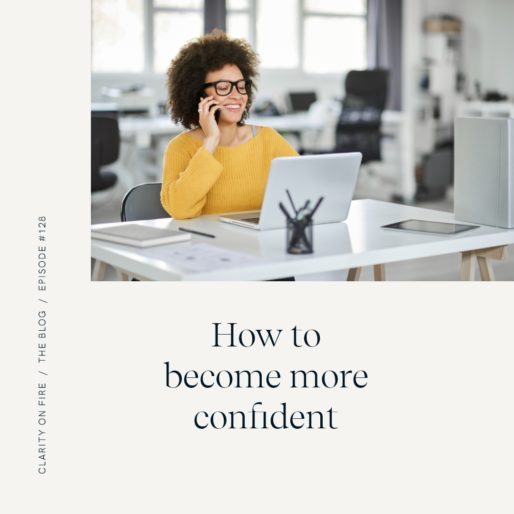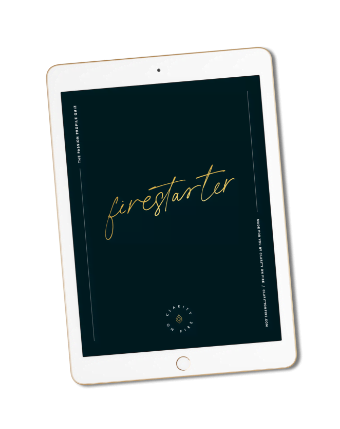Click the play button below, or subscribe and listen through our podcast on iTunes, Stitcher, Google Play, or Spotify.
Podcast: Play in new window | Download
We’ve all heard the advice that, if you want to be a more confident person, you’ve got to “fake it ‘til you make it.”
As in, if you pretend to be confident for long enough, eventually you’ll actually FEEL confident.
Who knows, maybe that works for some people. But I think for most of us, faking confidence when we’re not feeling it just makes us feel … well, fake.
A client of mine has been role-playing the confident, bold girl-boss at her latest job. In her mind, confident people are the ones who walk into a room and immediately take charge; they’re the ones “crushing it” at work and “doing it all” in life in general. So she’s been trying to act the part, and from an outside perspective she’s doing it quite convincingly.
The thing is, she’s a ball of anxiousness on the inside. She feels like a fraud, she’s constantly worrying that it’s all going to come crumbling down around her, and she’s tired and overwhelmed all the time.
Her attempt at becoming a more confident person isn’t working because she’s going about it entirely wrong. In fact, her whole concept of confidence is skewed, as is most of ours.
Confidence isn’t about being the loudest, boldest person in the room. It’s not about “doing it all” or “crushing it” in life. It’s not about being fearless or never having doubts.
It’s about something much deeper and far less sexy.
CONFIDENCE = SELF-TRUST
The thing I’ve noticed that all truly confident people have in common is that they trust themselves.
They trust themselves to be authentic, no matter what situation they’re in.
They trust themselves to advocate for their own needs and desires.
They trust themselves to bounce back from failures, challenges, and setbacks.
They trust themselves to make good decisions.
They trust themselves to follow through on their goals and intentions.
The reason why confident people seem so grounded, solid, and self-assured is because they trust themselves to handle whatever life throws their way.
It’s not that they believe they’re immune to failure or rejection or embarrassment or things generally falling apart (as in, the things most of us are constantly fretting about). They just trust in their ability to pick themselves up, brush themselves off, and keep moving.
LIFE IS SO MUCH HARDER WHEN YOU DON’T TRUST YOURSELF
When my clients tell me they want to be more confident, what they’re really saying is that they’re tired of feeling anxious, constantly worrying, and getting stuck in analysis paralysis — all signs that they’re seriously lacking in the self-trust department.
Here are a few telltale signs that you could do with a bit more self-trust:
- You often feel anxious, and you’re a bit of a worrywart.
- You’re afraid of change, so you’re unwilling to “rock the boat,” even if you’re not super happy in your current situation.
- You crave other people’s praise and validation.
- You’re indecisive, so you seek other people’s advice on decisions big and small in your life.
- Once you finally do make a decision, you’re constantly second-guessing yourself and wondering if you made the wrong choice.
- You’re a master procrastinator who has trouble following through on things you intend to do…
- OR you’re a control freak who needs everything to be “just so” or else you feel stressed and frantic.
If you relate to even a few of those symptoms, you know how exhausting it is to not trust yourself.
YOU’RE NOT DOOMED TO BE AN ANXIOUS PERSON FOREVER
The good news is, you have every ability to become a more confident, self-trusting person. You weren’t born a worrywart, and you don’t have to keep living with constant low-grade anxiety.
Here comes the not-sexy part: Building self-trust takes time.
Think about your closest friend in the world, the person who knows you better than anyone on the planet — you didn’t divulge your deepest, darkest secrets to that person within 15 minutes of meeting them. They started out being a complete stranger! It took time for them to earn your trust enough for you to share your inner world with them and know that you can rely on them in a crisis.
Building self-trust is the same way. You’ve got to prove to yourself that you’re someone who is worthy of trust in the first place.
It’s simpler to do than you might imagine. Don’t mistake that for easy, though. You’re going to have to get uncomfortable and drum up some serious courage.
HOW TO IMPROVE YOUR SELF-TRUST AND BECOME MORE CONFIDENT
Do things that scare you.
I read a memoir several years ago called My Year with Eleanorin which the author, Noelle Hancock, spent an entire year of her life taking literally Eleanor Roosevelt’s advice to “do one thing every day that scares you.”
Every day, for 365 days, she challenged herself to do things she was afraid of, from the smallest things (like asking someone in a movie theater to stop talking) to the most terrifying (like cage diving with sharks). At the start of the year, she was crippled with anxiety and barely left her house, and by the end of the year she felt more confident than ever before in her life.
That’s because doing hard, scary things builds resilience, which is a key ingredient in self-trust.
Keep your commitments to yourself.
A big part of trust — in yourself and others — is believing in someone’s reliability. So if you have a pattern of setting goals for yourself and not following through, then your self-trust is going to take a hit.
The reason so many of us struggle with follow-through is because our expectations of ourselves are WAY too high, so it’s impossible to not fall short. Instead try making small, attainable commitments to yourself (like “drink 8oz more of water a day” or “get in bed 20 minutes earlier each night” — listen to our podcast episode about “all-or-nothing thinking” from October 2018 for more examples), and congratulate yourself when you follow-through, no matter how simple.
As you prove that you can rely on yourself for the little things, it’ll be easier to trust yourself with the big stuff.
Rewrite your story as a hero’s journey.
A client of mine believes she’s not trustworthy with money. She desperately wants to make more, but a part of her is afraid she won’t handle it wisely, so she’s been keeping herself stuck.
The thing is, it was clear to me that she’s actually very responsible with her money, and I know she’s overcome a lot of financial hardships in her life. She just couldn’t see it. So I asked her to write out her money story from a third-person perspective, placing herself as the heroine in the story who faced challenges and came out on the other side stronger, wiser, and victorious.
Seeing herself through that new lens made her see what I’d seen all along: that she’s made lots of smart decisions with her money in the past, so she can trust herself with more money when it comes in. Soon after, she got that raise at work she’d been wanting, and she had no anxiety about what to do with the extra money.
Try writing your own hero’s journey story, whether it’s about money or any other topic, to remind yourself just how much you’ve already overcome and how trustworthy you are.
Build your intuition muscle.
Getting in tune with your intuition and trusting your gut feelings is a huge part of self-trust. When you believe that your inner guidance is always trying to lead you in the right direction, and you get better and better and listening to that inner voice, then decision-making becomes are far less agonizing experience. The more you trust your intuition, the more confident you feel about all of your choices.
We shared a bunch of ways you can start listening to and trusting your intuition in last week’s podcast episode called “Honing your intuition (& knowing when it’s really fear),” so check that out for a few ways to start building that intuition muscle.
If you’ve been struggling with self-trust lately, I want to know which of these approaches to building confidence you’re going to try first. Share with me, in the comments!
Much Love,
Kristen (& Rachel)
IF YOU LIKED THIS, YOU’LL ALSO LOVE…
Overcoming impostor syndrome (July 2018)
Honing your intuition (& knowing when it’s really fear) (June 2019)
Getting over your ‘all or nothing’ obsession with Amy Everhart (October 2018)
Treating life like a magical scavenger hunt with Francisca Hernandez (November 2018)


